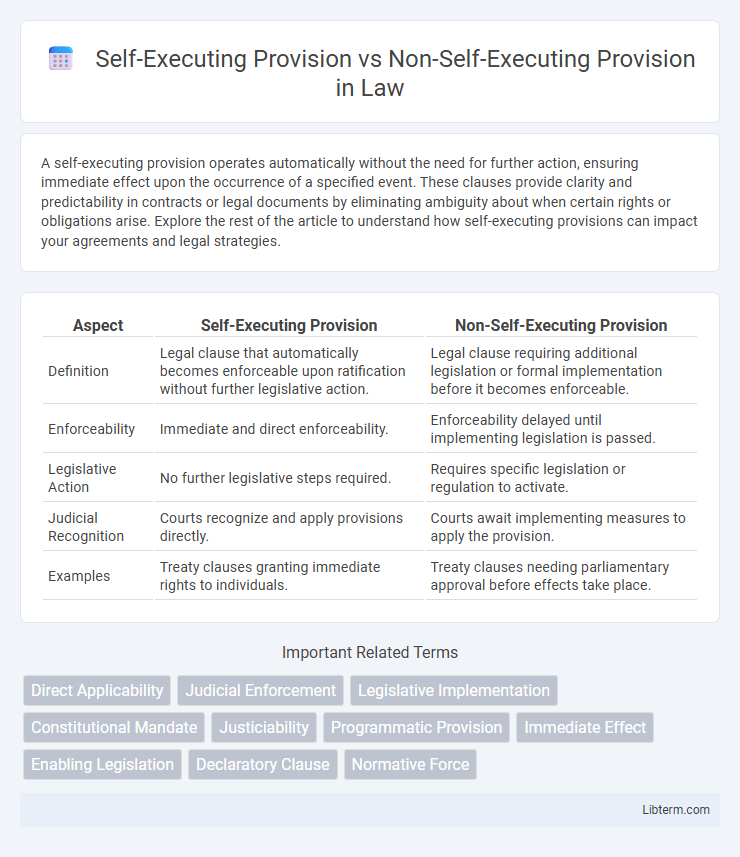A self-executing provision operates automatically without the need for further action, ensuring immediate effect upon the occurrence of a specified event. These clauses provide clarity and predictability in contracts or legal documents by eliminating ambiguity about when certain rights or obligations arise. Explore the rest of the article to understand how self-executing provisions can impact your agreements and legal strategies.
Table of Comparison
| Aspect | Self-Executing Provision | Non-Self-Executing Provision |
|---|---|---|
| Definition | Legal clause that automatically becomes enforceable upon ratification without further legislative action. | Legal clause requiring additional legislation or formal implementation before it becomes enforceable. |
| Enforceability | Immediate and direct enforceability. | Enforceability delayed until implementing legislation is passed. |
| Legislative Action | No further legislative steps required. | Requires specific legislation or regulation to activate. |
| Judicial Recognition | Courts recognize and apply provisions directly. | Courts await implementing measures to apply the provision. |
| Examples | Treaty clauses granting immediate rights to individuals. | Treaty clauses needing parliamentary approval before effects take place. |
Introduction to Self-Executing vs Non-Self-Executing Provisions
Self-executing provisions are legal clauses that become effective immediately without requiring additional legislative action, ensuring automatic enforcement. Non-self-executing provisions, in contrast, depend on further legislation or implementation measures before they can be enforced, often delaying their practical effect. Understanding this distinction is crucial for interpreting the immediacy and applicability of constitutional or treaty obligations.
Definition of Self-Executing Provision
A self-executing provision is a clause in a treaty or legal document that automatically becomes effective without the need for additional legislative action or implementation measures. It ensures immediate enforceability upon ratification, providing clear rights and obligations directly applicable in domestic law. In contrast, a non-self-executing provision requires further legislative or administrative steps before it can be enforced, delaying its practical impact.
Definition of Non-Self-Executing Provision
A Non-Self-Executing Provision requires legislative action or specific implementation measures before it can take effect or be enforceable, unlike Self-Executing Provisions which operate automatically upon ratification. These provisions typically need formal laws, regulations, or governmental acts to translate their intent into practical application, ensuring clear procedural frameworks are established. The distinction is critical in constitutional law and international treaties, influencing the timeline and effectiveness of legal obligations.
Key Differences Between Self-Executing and Non-Self-Executing Provisions
Self-executing provisions automatically become enforceable upon ratification without need for implementing legislation, whereas non-self-executing provisions require additional legislative action to take effect. The key difference lies in their enforceability; self-executing clauses create immediate legal rights or duties, while non-self-executing clauses outline goals or principles that must be operationalized by lawmakers. Courts rely on the text and intent to determine whether a provision is self-executing, impacting how treaties and constitutional clauses are applied domestically.
Legal Significance of Self-Executing Provisions
Self-executing provisions have immediate legal effect without requiring additional legislation or administrative action, ensuring prompt enforceability of treaty obligations within domestic law. This intrinsic enforceability enhances judicial efficiency by allowing courts to apply international agreements directly, safeguarding individual rights and state responsibilities. In contrast, non-self-executing provisions depend on implementing measures, delaying or limiting their domestic applicability and judicial enforceability.
Legal Impact of Non-Self-Executing Provisions
Non-self-executing provisions require legislative action to become enforceable, which can delay or complicate the implementation of constitutional or treaty rights. Their legal impact often results in judicial reliance on local laws or statutes to give effect to these provisions, potentially limiting immediate judicial remedies for affected parties. Non-self-executing provisions may also lead to inconsistencies in enforcement and create uncertainties in legal interpretation until proper legislation is enacted.
Examples of Self-Executing Provisions
Self-executing provisions automatically have legal effect upon ratification without needing additional legislative action, such as treaty articles granting immediate rights to individuals or obligations binding states directly. Examples include the U.S. Constitution's Supremacy Clause, which ensures treaties become the supreme law of the land, and certain human rights treaty provisions that courts enforce directly. In contrast, non-self-executing provisions require implementing legislation to be enforceable in domestic courts, delaying their practical application.
Examples of Non-Self-Executing Provisions
Non-self-executing provisions require legislative action or implementation measures before they take effect, such as the International Covenant on Economic, Social and Cultural Rights (ICESCR), which mandates states to enact laws ensuring rights like education and health care. Other examples include treaties that obligate parties to pass domestic laws for enforcement, like certain human rights treaties needing national legislation to guarantee procedural rights. These provisions contrast with self-executing ones, which automatically become enforceable upon ratification without additional legislation.
Implications for Lawmakers and Courts
Self-executing provisions automatically have legal effect without requiring further legislation, providing clarity and immediate enforceability, which simplifies judicial interpretation and reduces legislative workload. Non-self-executing provisions demand detailed legislative action to define their scope and application, often leading to delays and increased judicial challenges over intent and implementation. Lawmakers must carefully draft constitutional or statutory language to balance immediate enforceability with the need for legislative flexibility, while courts interpret ambiguities and resolve conflicts arising from non-self-executing mandates.
Conclusion: Choosing Between Self-Executing and Non-Self-Executing Provisions
Choosing between self-executing and non-self-executing provisions hinges on the desired immediacy of legal effect and the framework of judicial enforcement within a jurisdiction. Self-executing provisions automatically create rights or obligations without needing further legislative action, ensuring prompt applicability, whereas non-self-executing provisions require enabling legislation or judicial intervention to have effect. Legal practitioners and policymakers must evaluate the balance between clarity, enforceability, and legislative intent when deciding which type of provision to implement.
Self-Executing Provision Infographic

 libterm.com
libterm.com